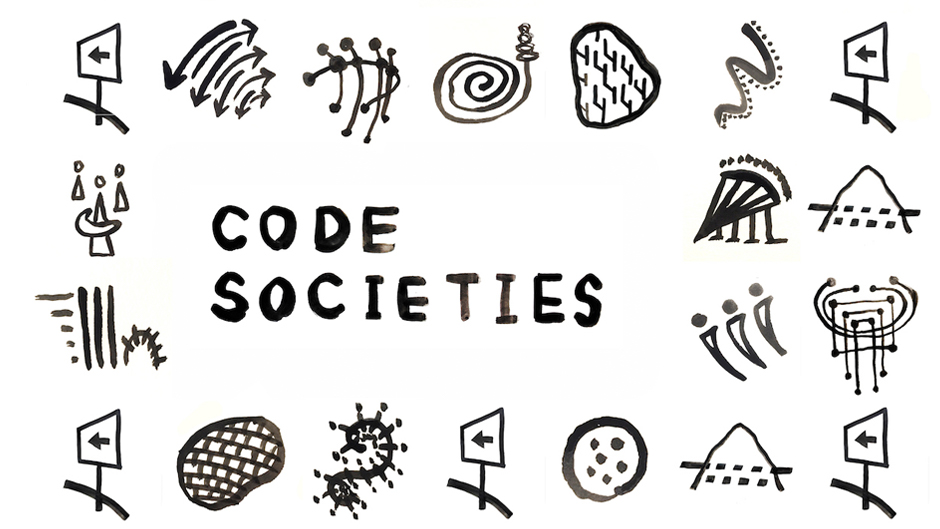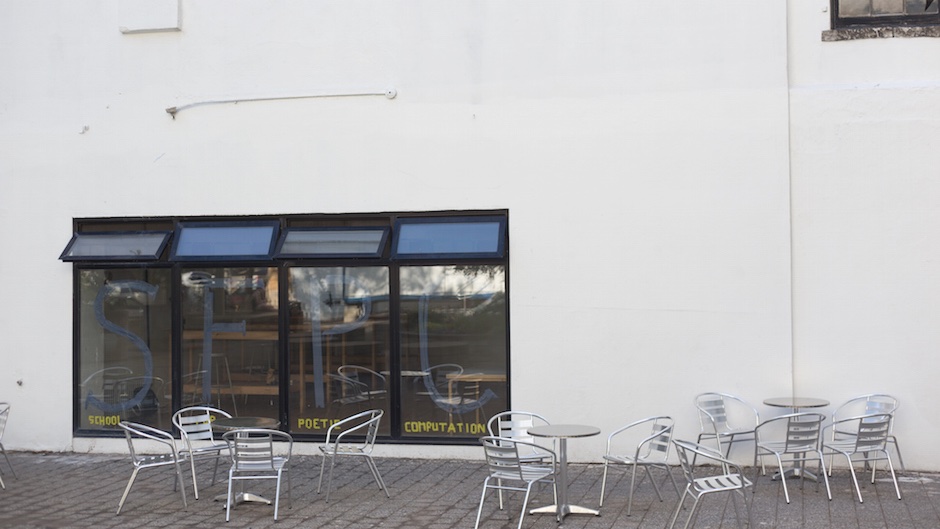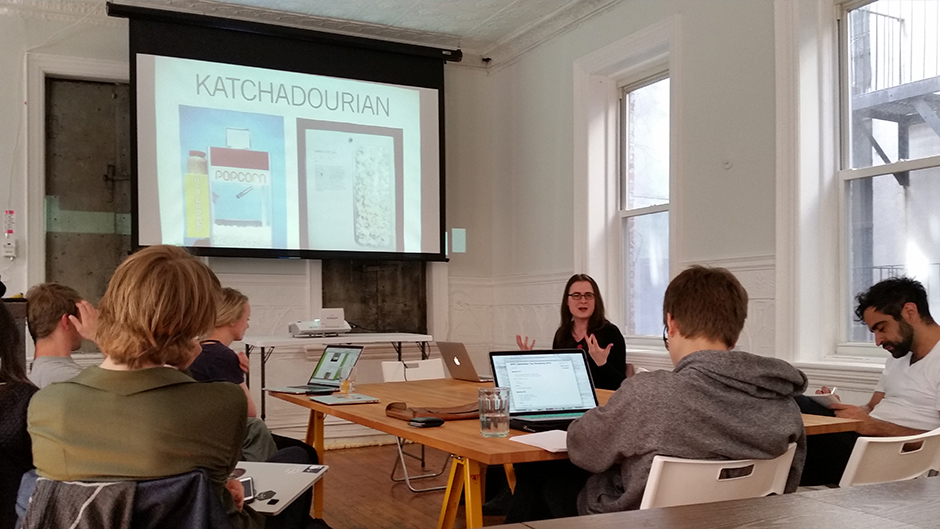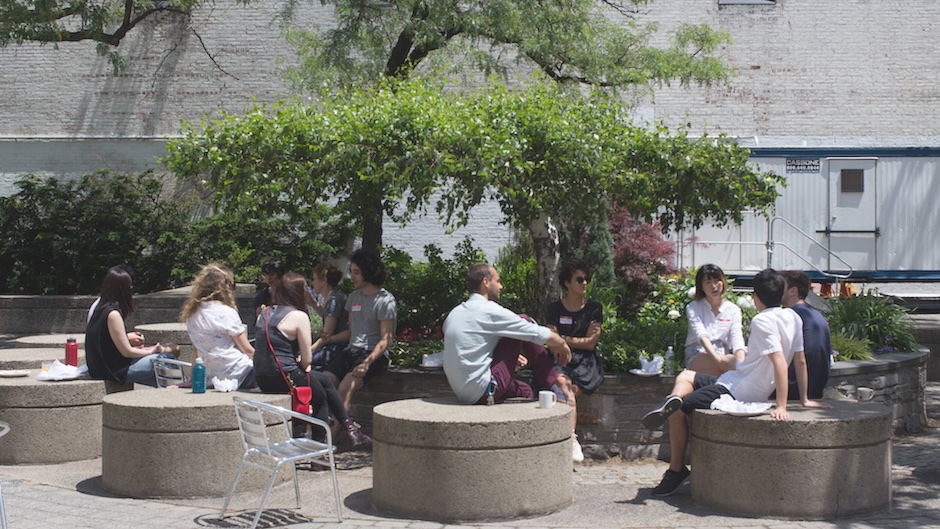Call for Students: Code Societies
- Three-Week Session, Monday July 2nd – Saturday July 21st
- @ SFPC, 155 Bank Street, West Village, NYC
- 6:30pm - 9:30pm, Evening Classes
- Applications have closed
SFPC’s Summer Intensive, Code Societies will examine the ideological and mythological attributes of computation, concentrating on the poetics and politics of culturally embedded software. How do different platforms and processes — including algorithms, data collection, social media, networks, simulation, and ritual — yield distinct modes of seeing, thinking, and feeling, structure social organization, and reinforce existing systems of power? Through a balanced study of critical theory and hands-on making workshops, students will create several small projects that explore and question these ideas. Students will be introduced to Python and discover poetic, playful, and powerful ways to use computation. All levels of programming ability welcome and an enthusiastic willingness to reconsider how code shapes and is shaped by society required!
“Technology is not neutral. We’re inside of what we make, and it’s inside of us. We’re living in a world of connections — and it matters which ones get made and unmade.” - Donna Haraway
Who are the teachers?
- Allison Parrish (3 Classes) - Allison is a computer programmer, poet, educator and game designer whose teaching and practice address the unusual phenomena that blossom when language and computers meet. She teaches at NYU’s Interactive Telecommunications Program.
- Shannon Mattern (2 Classes) - Shannon is an Associate Professor of Media Studies at The New School. Her writing and teaching focus on archives, libraries, and other media spaces; media infrastructures; spatial epistemologies; and mediated sensation and exhibition. She is the author of The New Downtown Library: Designing with Communities, Deep Mapping the Media City, and Code and Clay, Data and Dirt: Five Thousand Years of Urban Media.
- Lauren McCarthy (2 Classes) - Lauren is an artist whose work examines how surveillance, automation, and network culture affect our social relationships. She is also the creator of p5.js and teaches at UCLA Design Media Arts.
- danah boyd (1 Class) - Founder of Data & Society and Principal Researcher at Microsoft Research. She is a Visiting Professor at New York University’s Interactive Telecommunications Program, an academic, and a scholar whose research examines the intersection between technology and society.
- Melanie Hoff (1 Class - Lead Organizer, On-Site Support) - Artist, researcher, and educator examining technology’s influence on social conventions, political rhetoric, and the ways in which economies of behavior reveal distributions of power. She is the co-organizer of Cybernetics Conference and teaches at Mason Gross School of the Arts at Rutgers University.
- American Artist (1 Class) - American is an interdisciplinary artist whose work extends dialectics formalized in Black radicalism and organized labor into a context of networked virtual life. Their practice makes use of video, installation, new media, and writing to reveal historical dynamics embedded within contemporary culture and technology.
- Dan Taeyoung (1 Class) - Dan dreams of, and creates, cybernetic architectures, infrastructures for care, ethical pedagogy, and warm cooperatives. He teaches at the Graduate School of Architecture Planning and Preservation at Columbia University.
- Sarah Aoun (1 Class) Sarah is a data activist, operational security trainer, and Ford-Mozilla Open Web Fellow working on data privacy and security. She worked with activists, journalists, grassroots social movements, and NGOs in the US and MENA region on social justice, digital security, ethical data & privacy, and data-driven storytelling.
-
Taeyoon Choi (1 Class, Session Advisor) - Taeyoon is an artist, a co-founder of School for Poetic Computation, a fellow at Data and Society and an adjunct professor at NYU ITP. In 2018, Taeyoon is working on Distributed Web of Care and ongoing research with a critical perspective towards technology, ethics, justice and sensitivity to the concept of personhood.
- 15 sessions in total with a final presentations. More teachers and speakers to be announced!
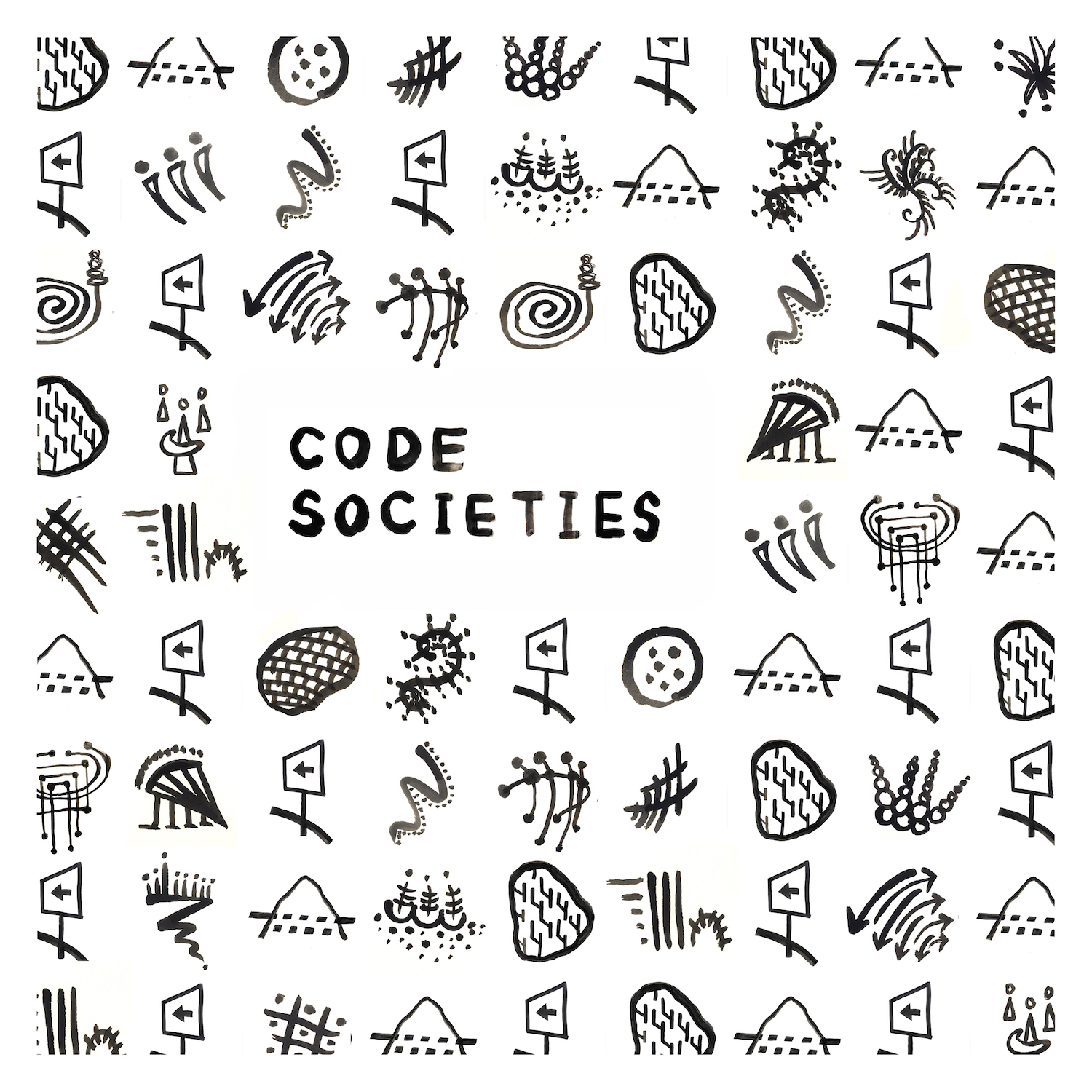
What will happen in these three weeks?
Classes are held in the evenings Monday-Friday from 6:30-9:30pm with a day off on July 4th. SFPC space will be open for students on weekdays between 1pm-6pm. The session will culminate in a party on the afternoon of Saturday July 21st, where students can invite their friends and present their favorite projects.
Students will have full access to the space for the two weeks of the session to work on projects between classes and mentors will be readily available for technical, conceptual, and artistic guidance.
How do I apply?
Applications have closed.
We accept up to 18 students on a rolling basis. We will respond to your application within 2 weeks of submission. Rolling admissions means there are fewer and fewer slots the longer you wait, so if you’re interested in the program get your application in early!
How competitive is the admissions?
SFPC admissions is highly competitive. Every session, we receive up to 80 applicants and select 18. We focus on creating diversity among our student body. We work with a group of alumni and teachers to review and select students based on their work samples and essays.
How much is tuition?
$2,500 USD for the 3-week program. You’ll also need to cover your own cost of living, including housing and meals (recent alumni report this to be in the range of $800 - $1400). Upon acceptance, payment of full tuition, your space in the class will be reserved. SFPC tuition goes directly to paying for the teachers, organizers, materials and space that make sessions like this possible.
Do you offer scholarships?
We are completely self-funded, which dramatically limits our ability to offer scholarships. In Code Societies, we are offering two work-study opportunity to a qualified applicant who would be expected to work 5 hrs/week in exchange for a 50% reduction of tuition. We’re particularly looking out for women, people of color, disabled person, people under-represented in the field of art + technology, and those with financial need.
Please note that if you apply for work study, we will consider your application separately from the general admissions applications, since we have little flexibility regarding scholarships. This is for people who absolutely need assistance to participate in SFPC. Occasionally, students have received support from cultural foundations, schools or current employers and we are happy to provide supporting materials as proof of acceptance.
Cancellation and refund policy
- If you are accepted between April and May, but if you need to cancel, we can give you 100% refund up to June 15th, 2018.
- 50% refund between June 15th – July 27th, 2018.
- 25% refund between June 28th – July 1st, 2018.
- No refunds can be given after the first day of class.
- Participation is not transferrable to another person.
What is expected of me?
- Come to all classes and thoughtfully engage with your classmates and teachers.
- We are looking for autodidacts from all backgrounds who are curious, generous and open.
- We welcome students with a broad array of technical experiences–no coding experience is required, but a basic comfort level with technology is preferred.
- B.Y.O.Laptop (Mac / PC / Linux)
Where is SFPC?
We are located at 155 Bank Street, in the courtyard of the Westbeth Artists’ Community in Manhattan’s West Village, New York City.
Contact Us
Feel free to contact Code Societies lead organizer Melanie Hoff (hoffmelanie@gmail.com) with any questions about the Code Societies session, or info@sfpc.io for any general questions about the school.
Image credits: Taeyoon Choi, Melanie Hoff, SFPC
SFPC is filled with amazing people and an open mindset to learning, and doing. It has taught me different ways of thinking, ones that I would be sure to bring back to my endeavors outside of the art world.
I'm half way through the program and I'm already missing being here. SFPC was a much needed breath of fresh air in my hectic creative existence, an unlikely place to stop and remind myself what was it I was into in the first place.
SFPC messed up my life a little bit. Actually, I think it's going to mess it up a lot. Before this program I thought I knew what I was doing and what the shape of my life was going to look like. Now I don't and each day I wake up scared I won't get to be a part of a community like this again. Everyday also now brings a fresh but welcome creative terror to overcome. Also I think I may have ended up moving to New York accidentally.
SFPC is the best place you can explore your interest as much as you want and the place you start to write your own poem.
SFPC is not really a school or a course — it is more like a door into an extraordinary world. It is driven by passion, kindness and the thrill of teaching and learning. I would love to live those inspiring weeks all over again.
SFPC was amazing — life-changing even — i want to do all this stuff for the rest of my life!
I've never been consistently surprised and inspired as much as at SFPC.
If you think SFPC is what you think, that will be wrong. SFPC is a space for a group of people who badly want to try something new. SFPC will become a spirit embedded in your blood which makes you think things with a different angle, just like its motto: more poetry, less demo.
I learned a lot at SFPC. It was only a 2 week program last time, but I learned many things from other participants and got the chance to explore and fail freely. SFPC helped me to reshape the way I think. It's your turn.
School For Poetic Computation is equal parts The Factory, childhood blanket fort, and mad scientist's lab. I learned a ton from the teachers and the whole SFPC community in a huge collaborative and exploratory environment.
Attending SFPC is like walking into an all day buffet supplied with food from hyper-talented chefs. There's more than you could ever consume, naturally, and you will most likely find yourself requiring a digestion period, but holy crap is it tasty.
My takeaway from SFPC: Never settle for code that isn't at least a little bit magic
In SFPC I found a great community and it gave me the confidence to take on coding projects I couldn't have done before.
SFPC is the purest, most honest exchange of knowledge and experience among peers I have ever experienced. It is a supportive space where everyone learns from everyone, and bridges are built that continue to be strengthened for years to come. You won’t get a certificate or a title at the end of it, but I would be amazed if you ever looked at your world the same again. I haven’t.
